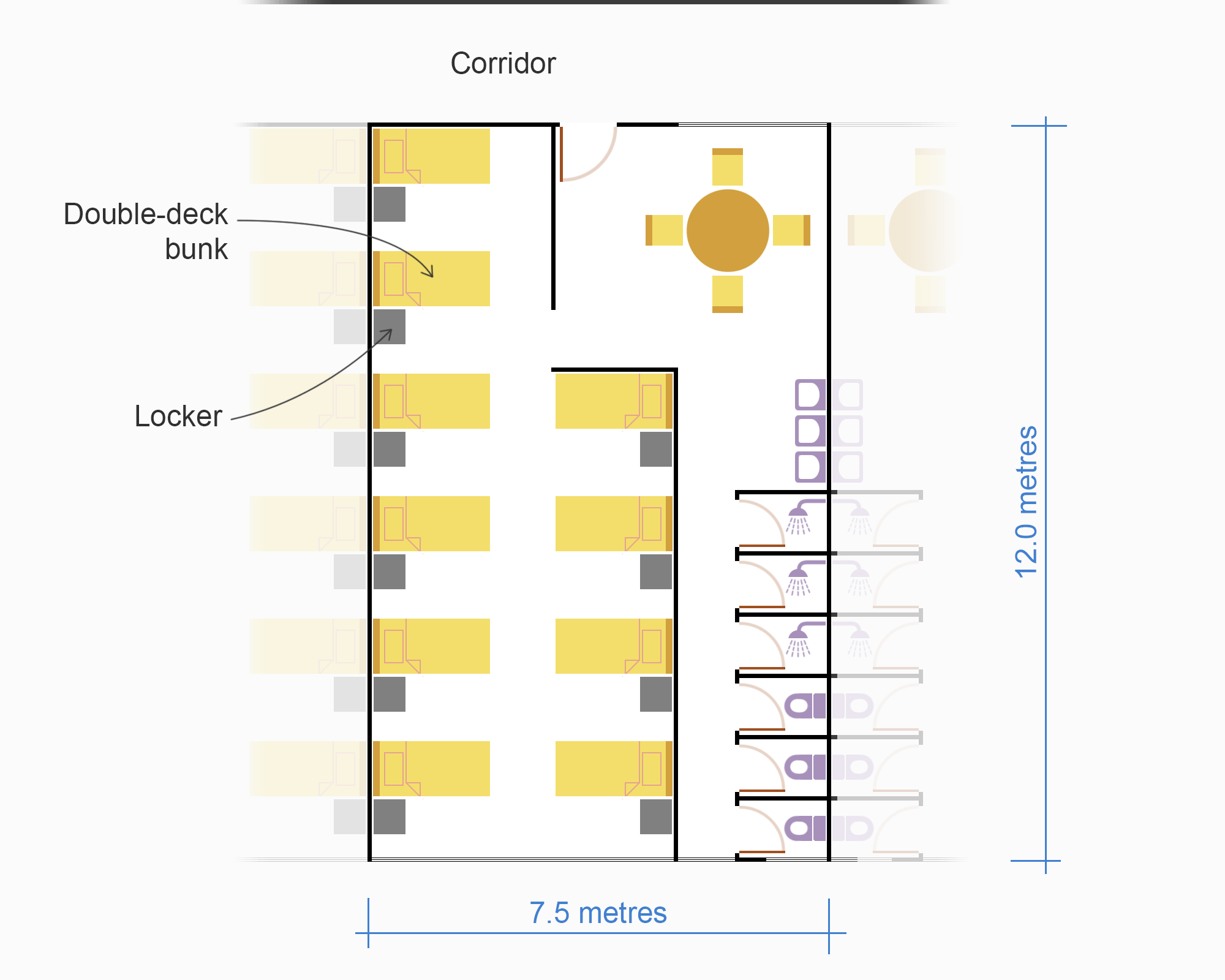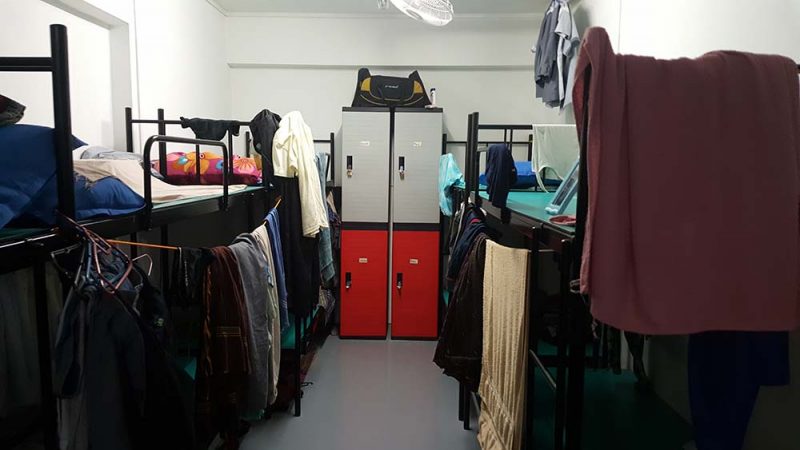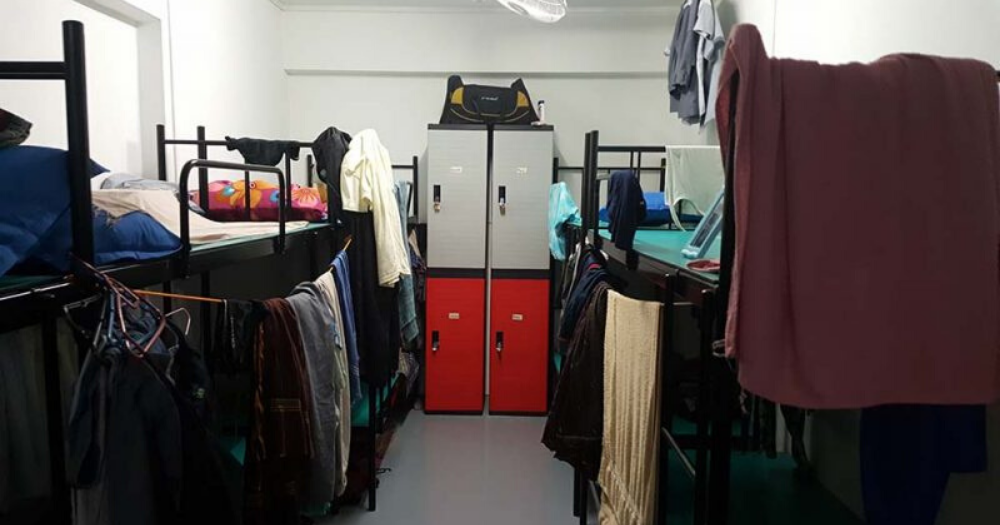As Singapore's number of confirmed cases of Covid-19 infection has surged to over than 1,300 cases, a concerning trend has emerged: The increase in number of cases linked to clusters at migrant worker dormitories and construction sites.
As of 12pm on Apr. 5, there are 117 cases linked to eight dormitory clusters, and 19 cases linked to construction sites.
Minister for Manpower Josephine Teo announced on Sunday (Apr. 5) that the following measures have been put in place as part of "circuit breaker" measures to contain the spread at foreign worker dormitories and to safeguard public health:
- The two most affected dormitories, S11 Dormitory @ Punggol and Westlite Toh Guan, have been gazetted by MOM as isolation areas, with nearly 20,000 workers being put under quarantine.
- More safe distancing measures will be rolled out at all other dormitories in Singapore.
The measures beg the question, however, about whether they are enough to keep the tens of thousands of workers living in the dormitories safe.
Workers quarantined within dormitories
There are currently 63 confirmed cases linked to the S11 Dormitory @ Punggol cluster, which was first announced as a cluster on Mar. 30, with the majority of the confirmed cases being announced between Apr. 3 and Apr. 5.
Meanwhile, the Westlite Toh Guan dormitory cluster, which was announced on Mar. 31, has 28 confirmed cases linked to it. The largest spikes in cases were reported on Apr. 3 — with eight new cases announced — and Apr. 5, with 10 new confirmed cases.
Teo announced on Sunday that the 13,000 people living at S11 Dormitory @ Punggol and the 6,800 at Westlite Toh Guan dormitory, including workers and operators, must stay in their dormitories while serving their 14-day quarantine order.
Essential service providers, which make up a relatively small number of these workers, will be housed separately, outside of the dormitories.
Teo admitted that there is a risk of transmission in the dormitories:
"Within the dormitories, the workers are really like family. They interact with each other very regularly. So the risk of transmissions is there.
We will take further precautions to ensure that the interactions are minimised. There will be further adjustments to their daily routines."
She said that within the dormitories, more precautions will be taken to reduce intermingling between floors within the same block.
The number of people staying in the dormitories will be also be thinned out, and those who are unwell, even if they are not tested positive for Covid-19, will be relocated to isolated sick bays.
The Ministry of Health said that workers will be provided with daily meals, as well as masks, hand sanitisers, thermometers and digital connectivity.
"We want to give foreign workers the assurance that these measures are taken in their interests, and their well being", Teo added.
Poor living conditions: Cockroach infestation, overflowing urinals
Within the dormitories, however, it appears that the assurance may not be present for all workers.
Rather, there is fear amongst the workers due to the unsanitary and unsafe living conditions, reported The Straits Times on Monday (Apr. 6).
More than six workers living in S11 Dormitory @ Punggol shared with ST about these conditions, claiming that the rooms are infested with cockroaches and the toilets are overflowing.
"There are many cockroaches in the kitchen and also in our rooms. The urinals in the toilets are overflowing with urine and the workers step on the urine and then walk to their rooms," an Indian worker was quoted saying.
And it isn't easy staying in their rooms, as they have been instructed to do, he said, as each room has 12 beds in it.
"You can see cockroaches crawling in the rooms. There are also many mosquitoes. Many people just stood outside their rooms, in the corridors. There are also smoking areas at each end of the corridors, and the toilets are also there. You can smell urine when you stand outside the rooms," he told ST.
Another worker added that many of the workers woke up at 8am on Sunday, Mar. 5, to await their breakfast, as the Ministry of Health (MOH) had announced that the workers will be provided with daily meals.
However, breakfast, which was rice with chicken and curry, only arrived around 10am.
Lunch (vegetables mixed with rice and two buns) was then only served from 3pm to 4pm, and dinner, comprised of white rice with green pea masala, only arrived at 9pm.
The worker informed ST that there were no social distancing measures in place while the workers queued up for their meals, and that most workers did not have masks on.
Tightly-packed dorms
In an article by local nonprofit Transient Workers Count Too (TWC2) on Friday, Apr. 3, the NGO noted that between 12 and 20 foreign workers sleep in double-decker beds in each dormitory room.
The idea of safe distancing within the dormitory rooms, then, is "laughable", wrote TWC2.
"In fact," the NGO wrote, "getting the men out of the rooms, counter-intuitive though it may be, may achieve better distancing."
The organisation warned about this in an ST forum letter, published one week before the first cluster linked to a dormitory (S11 Dormitory @ Punggol) was announced: "The risk of a new cluster among this group remains undeniable."
TWC2 called on the government in the forum letter to "announce in advance what plans they have to rehouse workers should clusters break out in dorms."
According to Singapore building codes, dormitory operators are only required to ensure that each worker is provided a minimum of 4.5 square metres of living space.
Here is a schematic sketch by TWC2 of a possible room housing 20 workers:
 Photo via TWC2.
Photo via TWC2.
The room is 12 metres by 7.5 metres, totalling 90 square metres, or 4.5 square metres per person.
And here is a photo by TWC2 of a room in another dormitory run by Westlite, located in Mandai:
 Photo via TWC2.
Photo via TWC2.
"To accommodate 20 men, there are ten double-deck beds. It’s quite a squeeze getting that many in, and the bunks are about one metre apart.
Try to imagine how close they are. Typically, there’s laundry hanging everywhere as well, making the place feel damp.
We can put in three toilets and three shower rooms within those 90 square metres, producing a ratio of six or seven men per toilet or per shower. There’s hardly any space left except for maybe a table and a few chairs."
TWC2 laid out a few possibilities to lower the density of workers in the dorms and reduce the risk of the virus spread by moving a significant percentage of the men out of the dorms:
- Using canvas screens to create separation and private spaces, and convert the large, virtually-empty multi-storey carparks at Changi Airport into a "tent city".
- Use the large floor space of Changi Expo in the same way.
- Empty out army barracks to house the workers.
Another local NGO, Humanitarian Organization for Migrant Economics (HOME) has also released a statement about the situation, calling for authorities to proactively test residents in all dormitories with confirmed infections.
While the organisation acknowledges the resource constraints on mass testing, they wrote, the high density of the dormitories and the vulnerability of workers residing within them demand decisive pre-emptive action.
HOME also pushed for future structural changes in the treatment of migrant workers:
"Keeping them in such living conditions creates systemic vulnerabilities waiting to erupt.
This endangers the workers and the broader community: not only during pandemics, but even with smaller-scale disease outbreak such as TB.
Singapore has benefited so much from enjoying the fruit of their labour while keeping their cost low. We owe it to them and their families to spare no effort to protect them."
People call for better treatment of migrant workers
In light of the Covid-19 virus hitting the migrant worker community hard, many people have stepped up to voice the need for change and to facilitate the provision of assistance to those who need it.
Singapore Ambassador at-large Tommy Koh spoke out about the poor conditions for Singapore's foreign worker dormitories, calling them "a time bomb waiting to explode" in a Facebook post on Monday (Apr. 6).
"The way Singapore treats its foreign workers is not First World but Third World," he wrote.
Koh also added that this situation should be "a wake up call to treat our indispensable foreign workers like a First World country should and not in the disgraceful way in which they are treated now."
Imran Bin Tajudeen, an assistant professor at the National University of Singapore's School of Design and Environment, also took to Facebook to respond to the ST article.
"It took a pandemic for us to finally take notice of the terrible conditions our migrant labourers are subjected to — a plight that activists (TWC2, Transient Workers Count Too, for example) have long spoken against", he wrote.
He continued:
Local poet Theophilus Kwek and others have worked to create a spreadsheet to crowdsource help for the needs of the migrant community."I'm ashamed. We are collectively to blame.
How we treat our migrant labour force, who are in effect indentured labourers with no real recourse to our empathy because they are "foreign", and who are entirely at the mercy of the construction firms that paid for their passes and their wages — how we treat them, reflects on how we collectively as a society treat our poor."
The spreadsheet includes information about how to support local organisations who are providing services and help during this time, the option to give direct donations, and the contact information of specific dormitories.
Individuals can also list out ways that they are able to contribute during this time.
On April 6, Manpower Minister Josephine Teo said in a Facebook post that there is no question in her mind that standards in dormitories should be raised.
She added that she will deal the Covid-19 situation first, before addressing the living standards issue in a more dedicated way.
As the numbers of confirmed cases of Covid-19 continue to rise in Singapore, it is important to keep our eyes on our most vulnerable groups, and how public health measures protect, or fail to protect, them.Related story:
Top photo via TWC2.
If you like what you read, follow us on Facebook, Instagram, Twitter and Telegram to get the latest updates.
